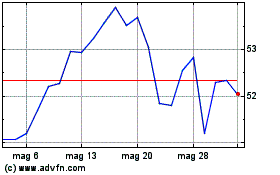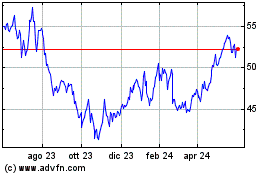(FROM THE WALL STREET JOURNAL 3/14/16)
By Suzanne Vranica and Nathalie Tadena
Madison Avenue has long tried to move beyond the 1960s image of
the advertising world depicted in the popular TV series "Mad Men,"
with its sexist jokes, office affairs and nearly all-white
workforce.
But a series of recent incidents and allegations paints an
unflattering portrait of the industry, highlighting the lack of
diversity that still exists in the advertising and marketing
business.
Last week, the chief executive of ad agency J. Walter Thompson,
whose clients include Kimberly-Clark Corp. and Macy's Inc., was
sued for alleged discrimination by a female subordinate who accused
him of an "unending stream of racist and sexist comments, as well
as unwanted touching." He denied the allegations in a statement
provided by the agency. JWT, which was also named in the suit along
with parent WPP PLC, said it was reviewing the matter and would
respond at the appropriate time.
Interpublic Group of Cos. recently fired the top executive at
its Campbell Ewald agency days after finding out about an email
from an agency employee that invited colleagues to celebrate
"Ghetto Day" with malt liquor, drugs and prostitution. Interpublic
didn't give a reason for the firing at the time, and the executive
didn't respond to a request for comment. A person familiar with the
matter said Interpublic learned of the email only after it had been
published in the trade press and the employee who sent it had been
fired.
Other controversies have stemmed from ads themselves. One, in a
2015 Bloomingdale's holiday catalog, was headlined "Spike Your Best
Friend's Eggnog When They're Not Looking," and featured a woman
laughing with her head turned as a young man gave her a sidelong
glance. The chain, owned by Macy's, apologized for the ad, which
some critics interpreted as promoting date rape. In 2014, Sony
Corp. pulled an online PlayStation video ad in which a female
doctor asks "How many times did you do it yesterday?" It acted
after bloggers criticized the ad as sexist.
According to data from the Bureau of Labor Statistics,
African-Americans, which represent 11.7% of the U.S. workforce,
accounted for 5.3% of the employees in advertising, public
relations and related services in 2015, down from 7.1% in 2005. The
industry has been more successful in recruiting Hispanics -- 16.4%
of the nation's overall workforce; they accounted for 11.7% of the
industry's jobs last year, up from 7.4% a decade earlier.
The percentage of women has stayed fairly steady at about half
of the industry's employees over the past 10 years, largely in line
with the overall population. But ad executives say relatively few
women can be found in the upper creative ranks where ad campaigns
are forged.
"The numbers show it; we have a real problem" with the lack of
women in creative posts, said Susan Credle, global chief creative
officer of Interpublic agency FCB.
While the lack of diversity in Hollywood and Silicon Valley has
attracted national attention recently, the ad industry has been
grappling with the issue for decades.
"Diversity is a tough one. We have spent a lot of time and
attention and resources and have very little to show for it as an
industry," said Bob Liodice, chief executive of the Association of
National Advertisers, which represents many of the nation's biggest
brands. While ethnic diversity is "very poor," he said the ad
business has done a "pretty good job" with gender diversity.
Interpublic, which started formal diversity and inclusion
programs in 2005, "has made significant strides in increasing
diversity at senior levels across all minority groups and among
women," said CEO Michael Roth.
Even so, the lack of diversity worries some big advertisers. "I
am sick and tired, as a client, of sitting in agency meetings with
a whole bunch of white straight males talking to me about how we
are going to sell our brands that are bought 85% by women," Brad
Jakeman, a top PepsiCo Inc. executive, said at a conference last
year to a roomful of the nation's largest advertisers.
In last week's lawsuit, Erin Johnson, JWT's chief communications
officer, alleges that CEO Gustavo Martinez "publicly asked
questions about which female staff member he should rape."
The suit also claims that Mr. Martinez, a native of Argentina,
made offensive remarks about African-Americans and Jews, such as
referring to personnel at an airport as "black monkeys" and telling
a reporter, during a meeting Ms. Johnson attended, that he disliked
living in New York's Westchester County because there were "too
many Jews." The suit says she complained to executives at JWT and
WPP, but nothing was done. She was put on paid leave last
month.
In a statement, Mr. Martinez said: "I believe I lead this
company with a collaborative and collegial style and did not create
the kind of working environment that has been described in the
complaint. I welcome the opportunity for the truth to come
out."
"We need a lawsuit like this to break this issue wide open,"
said Cindy Gallop, CEO of consulting firm
IfWeRanTheWorld/MakeLoveNotPorn and a founder of agency BBH New
York. "The reason this keeps happening in the industry is because
the business is controlled at the top by white guys."
Last year, in a survey of 328 women in advertising, 23% of the
respondents reported that they had personally experienced or
witnessed sexual harassment; just 8% said the responsible party was
punished. The survey was commissioned by the 3% Conference, a
movement dedicated to building a business case for more female
creative directors.
Nancy Hill, CEO of the American Association of Advertising
Agencies, responding to the survey, said employers should take
discrimination or harassment claims seriously, fully investigate
them and deal swiftly with offenders.
(END) Dow Jones Newswires
March 14, 2016 02:47 ET (06:47 GMT)
Copyright (c) 2016 Dow Jones & Company, Inc.
Grafico Azioni WPP (NYSE:WPP)
Storico
Da Giu 2024 a Lug 2024

Grafico Azioni WPP (NYSE:WPP)
Storico
Da Lug 2023 a Lug 2024
